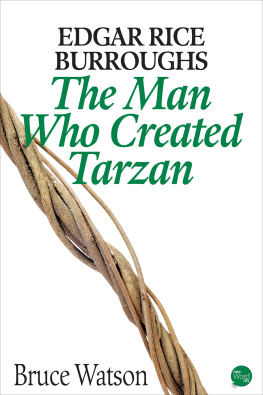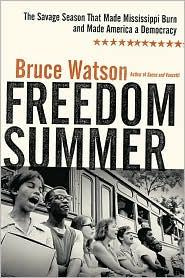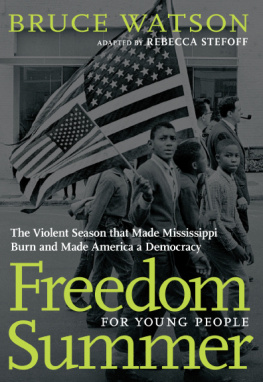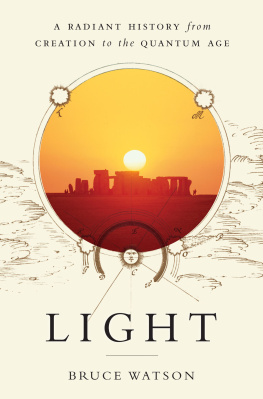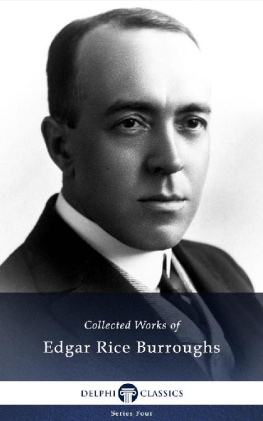During the mid-1920s, a strange jungle fever swept through much of the world. From Japan to Iceland to Latin America, thoroughly modern citizens fancied themselves lords of the jungle swinging on vines. Across America, tribes of kids took to the trees. In Germany, millions were inspired by the heroics of an ape-man. And throughout the Soviet Union, readers in offices, streetcars, and factories devoured an American book about a boy raised by African apes. In one village, peasants stood, mouths agape, as a soldier read them the story.
Meanwhile back at his ranch a balding writer paused in mid-sentence. Looking out his window, he pondered the orange groves of Californias San Fernando Valley. More than a decade had passed since he had published his first jungle saga. His mind brimming with tales, he had hoped never to write a sequel. That morning on horseback, he had felt as free as a soldier scouting the wilderness. Now, back at his typewriter, he was enslaved again. He hesitated for a minute, then tapped his weary imagination. There he saw vines, like story lines, tangled and inviting. The typewriter clacked as the reluctant writer churned out another story to satisfy the publics craving for Tarzan.
Swinging down through the decades, Tarzan is among the most enduring characters in American lore. In the century since his debut in 1912, dozens of comic strips, scores of radio serials, a dozen TV series, and 41 movies have kept the big guy in the loincloth in our hearts and on our screens. Yet Tarzans creator also cut a wide swath through the jungle of pop culture. In the first half of the twentieth century, the most widely read American author was neither Hemingway, Faulkner, nor Steinbeck. It was Edgar Rice Burroughs, whose paperbacks and pulp stories lay strewn through countless bedrooms of countless escapists like himself. Today, Burroughs remains in the pantheon of pop fantasy. On beyond Tarzan, his hyper-driven imagination takes readers to the subterranean kingdom of Pellucidar, the savage society of Barsoom, and an atlas worth of nether worlds and lost cities. His 74 novels have sold more than 100 million copies and been translated into a Babel of languages. And now, Burroughs has hit the screen again with Disneys film John Carter, based on his popular John Carter on Mars series.
Yet Burroughs was more than the sum of his stories. He remains one of the few writers who is also a corporation - Edgar Rice Burroughs, Inc. Long before movies came with merchandising rights, Burroughs turned Tarzan into the first mass-market action hero whose royalties supported the authors own high flying adventures. All in all, not bad for a man who didnt publish his first book until he was nearly 40, and who persisted in calling his stories rotten.
Midway through his career, when a publisher asked him to provide a brief biography, the author of Tarzan was stumped. Should he admit that had never been to Africa, or even east of Michigan? That before becoming a writer, he was a flop? Unable to provide a bland bio, Burroughs submitted a parody. Seems he was born in China, where his father was military advisor to the Empress. Raised in Pekings Forbidden City, he developed a taste for two of my favorite studies, Chinese philosophy and Chinese ceramics. Taken to America, he was kidnapped by gypsies and held by them for almost three years. After graduating from Yale summa cum laude, he explored Africa with Dr. Livingstone, escaped cannibals only to be shipwrecked, then made his way to the court of the Russian Czar, where he met his wife. I have tasted fame it is nothing, he concluded. I find my greatest happiness in being alone with my violin. The facts of Burroughs life were more mundane. He did not, for example, play the violin. But then, for a man of his imagination, facts were mere portals to worlds of unreality.
Burroughs father, a Civil War veteran wounded at Bull Run, ran his family like a platoon. Meals were at 7:30 A.M., noon, and 6 P.M. sharp. Each was announced by a gong resounding through the familys stately Victorian home in Chicago. The four Burroughs boys had better not be late. Edgar, born in 1875, was the youngest and hardest to tame. By the age of five, he was writing doggerel and drawing precocious doodles. Yet Ed (he considered Edgar the silly-assest name ever hitched to a male) was also a rebel, skipping school with a friend to go smoke and feel real devilish. A Union veteran didnt take to having a rebel in the family so at 14, Ed was sent to work on his brothers Idaho ranch. No sooner had he gotten a taste for range life than he was shipped back east to Phillips Andover Academy. He lasted just long enough to be elected class president before bad grades sent him packing. He would have preferred to study art he was still sketching constantly - but his father had a more manly career in mind.
Shortly after Ed Burroughs enrolled in the Michigan Military Academy, the Major received a telegram: Your son deserted Thursday. Letter will follow. Ordered back to the academy, he broke nearly every rule before finally knuckling under. He graduated as a captain and earned an appointment to West Point but failed the qualifying exam. After briefly teaching cavalry at his alma mater, he enlisted in the legendary U.S. 7th Cavalry. Custer had been dead for 20 years, however, and Burroughs military career was far from the stuff of legend. At Fort Grant in the Arizona territory, he shoveled manure, slept in a tent, and contracted dysentery. His lone adventure was a brief patrol in search of Apaches. I chased a good many Apaches, he later wrote, but fortunately for me I never caught up with any of them. Calling himself a bum soldier, he wrangled a discharge after only 10 months. A year later, when the Spanish-American War broke out, he tried to join Teddy Roosevelts Rough Riders but was rejected. I am always late for the thrill, he later lamented. I always get to the fire after it is out.
The first writing lesson is the simplest: Write what you know. But for the next decade, Burroughs knew only failure. All his life, he was torn between dreams and drab daily life. Standing just five feet eight inches, he was stocky and awkward, with little hope of fulfilling his love of all things military. Confined instead to desk jobs, he was dogged disappointment. In 1900, he married a Chicago socialite and settled down to work as treasurer of Major Burroughs battery company. He lasted three years, then set off on another quest. With wife Emma in tow, he went back to Idaho, where the couple lived on a houseboat while Burroughs and his brothers dredged for gold on the Snake River. In his spare time, he wrote and illustrated Snake River Cotton Tales, childrens poems for nieces and nephews. He also penned a lengthy fantasy set in the ancient palace of Pzvrthjk. Finally, when his search for gold turned up only sand, he got a job patrolling a railroad yard in Utah. The adventure ended when he and Emma auctioned all their furniture to buy train tickets home to Chicago. There Burroughs sold light bulbs and candy, ran the stenography pool at Sears and Roebuck, then ran his own advertising business into the ground. Desperate for adventure, he even tried to join the Chinese army. He was rejected. Decades later his memoirs summed up these years in just four words: I am a flop. Luckily, the yearnings of a flop are exactly what a writer needs to know to create the fiction called pulp.
To understand Burroughs career readers must imagine a foreign world - America when its media had little mass. In the early 1900s, a few movies showed in Nickelodeons. Wealthy families had Edison phonographs on their table, but unless one played a parlor piano, the only homegrown entertainment was reading. Boys like Burroughs had been raised on dime novels, but a new medium was tickling the common reader. Named for the cheap paper they were printed on, pulp magazines such as
Next page
